News & Articles
Browse all content by date.
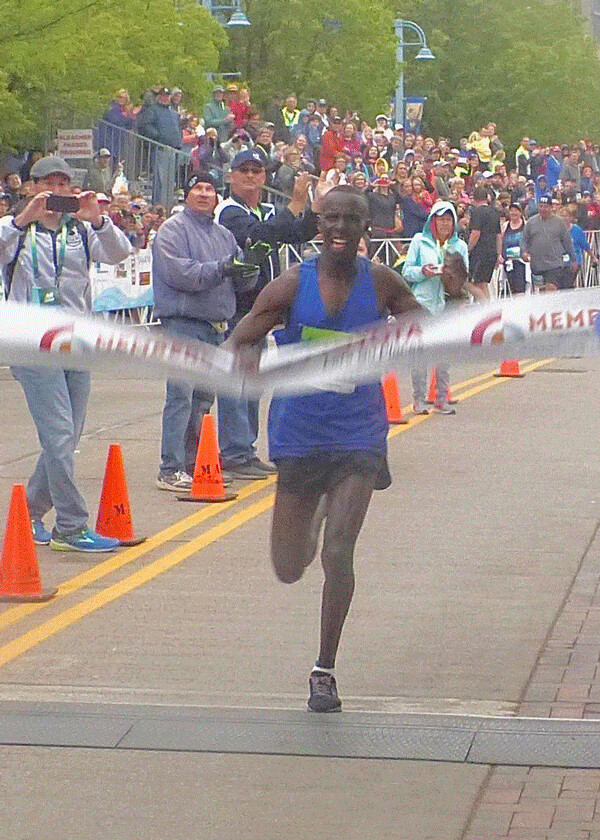
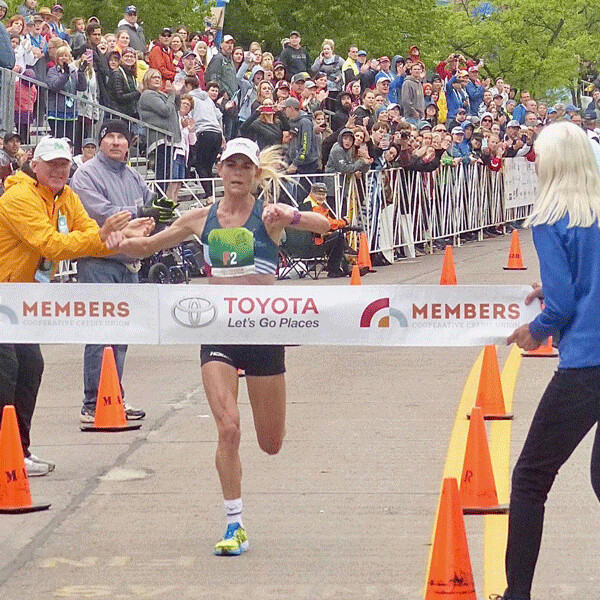
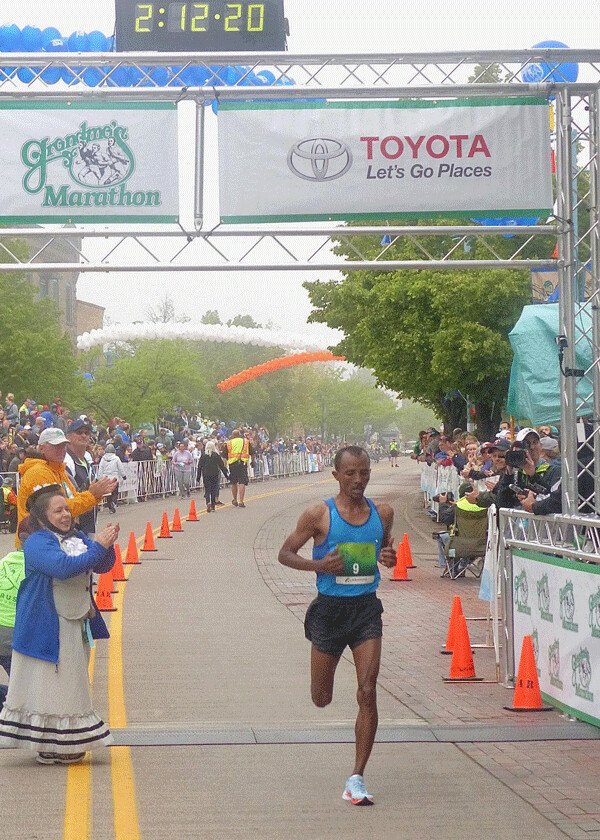
If this was the Indianapolis 500, Elisha Barno and Kellyn Taylor would have lapped the field. Instead, it was the 42nd edition of Grandma’s Marathon, so Barno in the men’s field and Taylor in women’s had to be satisfied with simply disappearing over the horizon for easy victories.
To carry the analogy further, Barno and Taylor could have made pit stops for a little candy at the Great Lakes Candy Store in Knife River, or maybe a quick lunch at Sir Benedict’s, and still gotten back on the 26.2-mile course in time to hold off their impressive but outdistanced gang of rivals.
The greatest difficulty for the media was which of the two to focus on as the biggest achievement: Was it Barno, the affable runner from Kenya who entered Grandma’s for the fourth straight year — and proceeded to win for the fourth year in a row? An incredible achievement, alone, as Barno, 31, claimed the third-fastest race in Grandma’s history at 2 hours, 10 minutes, and 6 seconds, leaving Ethiopia’s Birhanu Dare Kemal more than 2 minutes behind, at 2:12:21.
But Kellyn Taylor, a 31-year-old from the Milwaukee suburb of Sussex, Wis., and now lists Flagstaff, Ariz., as home, was running her first Grandma’s and seeking what she called redemption for a failure to finish the Boston Marathon. She got that and more, winning in 2:24:29, which shattered Sarah Kiptoo’s 2013 record of 2:26:32 by more than 2 minutes. She was also nearly 6 minutes ahead of Askale Merachi of Ethiopia, who took second for the second straight Grandma’s, and expressed no animosity because her 2:30:18 was the best she had ever recorded in a marathon.
Weather forecasts had steadily called for a gloomy Saturday, but after starting in dense fog and humid 50-degree weather up near Two Harbors, the cool and humid conditdions that the runners appreciated became heavy as the run progressed. Barno said that might be the reason he failed to break the event record of his countryman, Dominic Ondoro, who clocked a 2:09:06 to win in 2014.
“The weather was very nice from the lake,” said Barno. “But the air was heavy in the second half, and I couldn’t get the course record. I glanced back a couple of times and saw somebody running, but I guess it was just some fans.”
Informed he won by more than 2 minutes, he smiled and agreed that maybe closer competition might have spurred him to record time. “My plan was to win, and if someone was there with me, maybe I would have been faster,” he said.
Kemal said he was surprised Barno won so handily.
“I ran with him for about 15 miles, and after he broke away, I was trying to leave with him,” Kernal said. “But I changed my mind and went back to my own pace. I don’t know Barno. I was expecting another guy, or my friend, Teklu Deneke, to be the top competitors.”
Kernal acknowledged that he had run Grandma’s once before, finishing seventh two years ago, and when it was pointed out to him that Barno also had won that race, he laughed about getting a faulty scouting report.
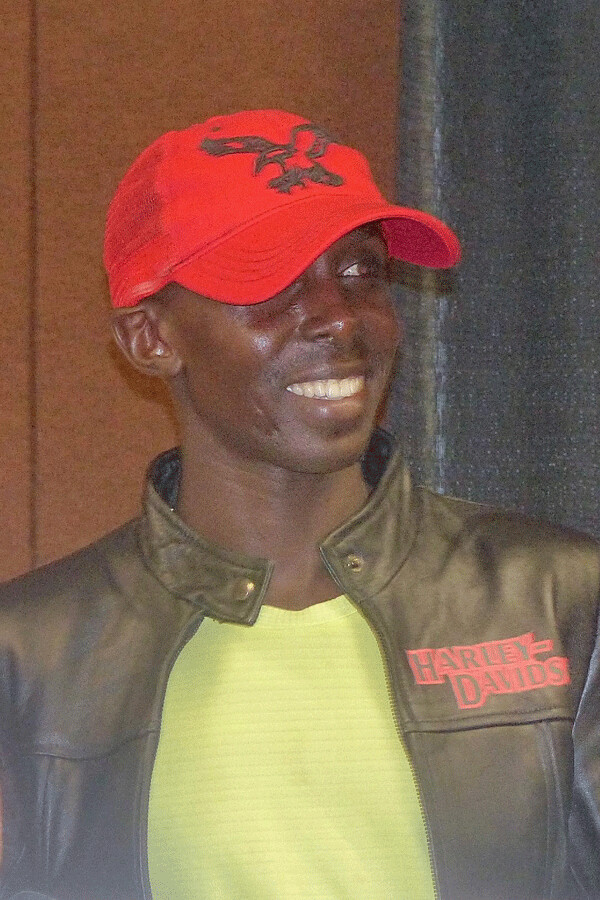
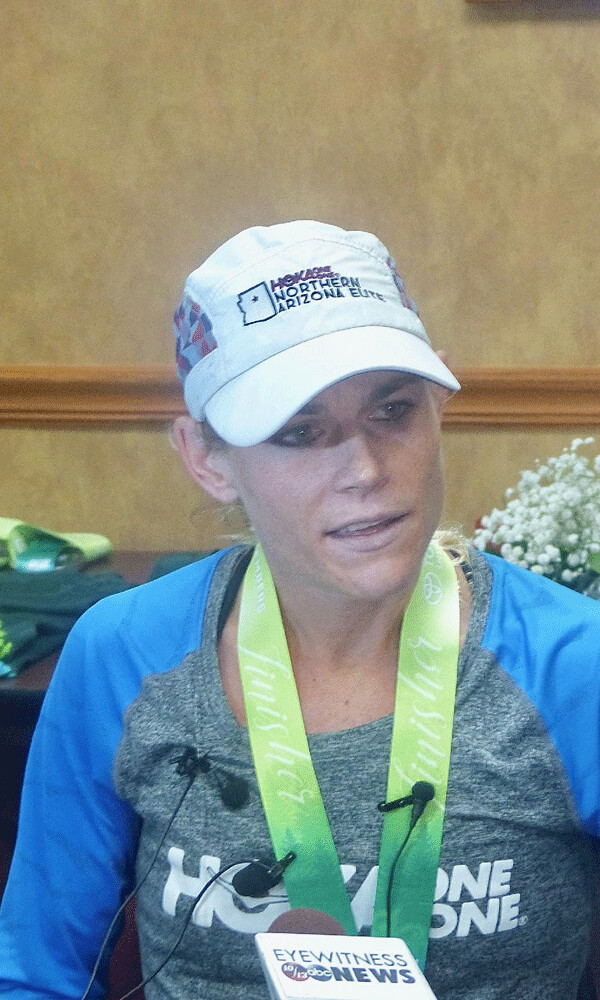
Barno, who is married and has two daughters under 10, has a small farm back in Kenya, near Eldoret.
Kernal is from Addis Ababba, Ethiopia, and said that after coming to the U.S. to train in Flagstaff and Albuquerque the last two years, this year he has been training in New York City. “I trained for this by running in Central Park every day,” he said.
On the women’s side, Taylor said she had prepared to run the Boston Marathon, but cold, harsh conditions caused her to drop out halfway through from hypothermia. That was on April 16, and she had signed a promotion contract that she wouldn’t run any other marathon for 60 days. She said she looked ahead and saw that Grandma’s was perfectly timed, coming 61 days later.
“I had heard great things about Grandma’s, and it’s super exciting to have the defending champion and the record holder in the field,” Taylor said before the race.
Afterward, she said, “I’m super-excited and relieved. To do one and not even finish it was very disappointing. Today, at the point when I did separate, I thought I might have to run alone. But there were a couple of gentlemen who were running at a pace of 5:30 miles, so I kind of latched onto them. Hanging with those guys was better than running alone.
“I felt pretty confident the last few miles. I love the course, and thought it was really fun. There were some fantastic runners here, and I could run with the group, but I didn’t want to gauge myself on how anyone else was doing.”
So Taylor simply ran away from everybody. Officially, her record time must go into the books as a “modified event record,” because officials had to alter the course and direct the runners left off Superior Street and then right on Michigan Street, and onward to 5th Avenue West. The distance was the same, but the “modified” term must be included.
She said it was the strongest she’s ever felt after a marathon. “My goal is to make the Olympic team, and this 2:24 definitely helps,” she said. “The last couple of miles, people were shouting encouragement. People keep pushing you to go faster and fasterm even if your body doesn’t want to.”
Askale Merachi, repeating as women’s runner-up, dismissed those who asked why she didn’t challenge Taylor. “I ran with her for about an hour,” Merachi said. “She was very strong, but I ran a 2:30 — my best time ever. I am very happy with my time.”
Duluthian Kara Goucher, 39, former Olympian now living in Boulder, Colo., who held the record in the half-marathon, and who placed second last year, finished 21st this time in her first attempt at that distance since last year’s Grandma’s. Monica Ngige won this year’s half-marathon in 1:09:55, 9 seconds off Goucher’s record. Panuel Mkungo won the men’s half at 1:02:50, improving on his secobnd-place of a year ago.
Aaron Pike, from Park Rapids, and Susannah Scaroni, from Illinois, won the men’s and women’s wheelchair marathon, Pike sin 1:26:48 and Scaroni in 1:37:32.
The marathon field of 8,232 saw 6,086 finishers, while 7,577 out of 9,284 entries finished the half-marathon.
| Tweet |


